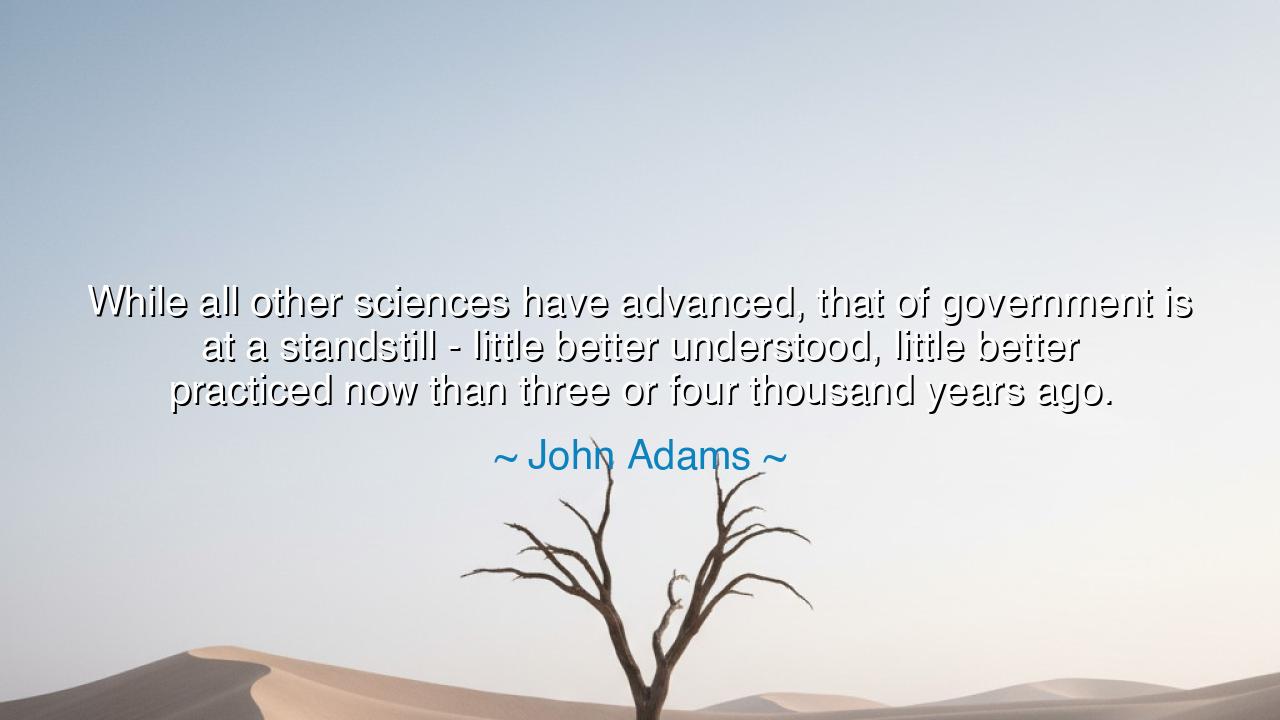
While all other sciences have advanced, that of government is at
While all other sciences have advanced, that of government is at a standstill - little better understood, little better practiced now than three or four thousand years ago.






The words of John Adams, one of the architects of American liberty, strike with timeless melancholy and moral fire: “While all other sciences have advanced, that of government is at a standstill — little better understood, little better practiced now than three or four thousand years ago.” In this declaration, Adams does not despair of humanity’s intelligence, but rather of its wisdom. He laments that though mankind has conquered the heavens, tamed nature, and harnessed the invisible forces of the earth, it still stumbles blindly in the art of governing itself. The quote is not a complaint against progress—it is a warning that material advancement without moral and civic enlightenment is but a gilded cage for folly.
At its heart, Adams’ statement speaks to the paradox of civilization: that while knowledge grows, virtue often remains unchanged. The science of government, unlike the sciences of chemistry or astronomy, deals not with stars or atoms but with human hearts—with ambition, greed, pride, and the hunger for power. These forces, Adams knew, are as ancient and untamed as the serpent in Eden. The ancients of Babylon, Egypt, Greece, and Rome wrestled with the same questions modern statesmen face today: How to balance liberty and order? How to restrain tyranny without surrendering to chaos? How to govern men who are free, yet flawed? In these struggles, Adams saw not progress but repetition—the same tragedies wearing new names.
The origin of these words lies in Adams’ deep study of history and philosophy. A student of Cicero, Polybius, and Montesquieu, he believed that the patterns of governance are eternal because the nature of man is eternal. The Greeks spoke of democracy, the Romans of republics, the monarchies of divine right, and yet all, in their time, fell prey to corruption, division, and decay. Adams, witnessing the birth of a new nation, feared that America too might repeat those cycles if it failed to learn from them. His insight was prophetic—for he knew that while technology and trade could enrich a people, only virtue and wisdom could sustain them. Without moral advancement, progress in science becomes progress in destruction.
History vindicates Adams’ lament. Consider the collapse of the Roman Republic—a state that had once boasted the finest system of checks and balances known to the ancient world. Its constitution, admired even by modern scholars, was undone not by ignorance of law but by the corruption of character. Senators sought wealth over duty, generals sought power over justice, and the people traded liberty for the comfort of empire. Rome’s architects of government had built a masterpiece of law, but they could not preserve the virtue needed to uphold it. Two thousand years later, nations still repeat this pattern: systems perfected in theory crumble under the weight of human weakness. Truly, as Adams said, the science of government stands still—not for lack of intellect, but for lack of moral evolution.
Adams’ words also carry a subtle humility. They remind us that knowledge alone cannot save civilization. The printing press, the steam engine, the computer—all tools of progress—can serve both freedom and tyranny. A tyrant with science is far more dangerous than a barbarian without it. Thus, Adams understood that the greatest discoveries in government are not found in laboratories but in the human soul. They are the discoveries of conscience, of justice, of the rule of law over passion. Until mankind learns to master itself, no constitution, no parliament, no republic will endure for long.
There is also hope hidden within his sorrow. For though Adams declared the science of government to be stagnant, he did not mean it must always remain so. He believed that through education and virtue, the tide could turn. The founding of America itself was an experiment in progress—a bold attempt to apply the lessons of history rather than repeat them. “Public virtue cannot exist without private virtue,” Adams wrote elsewhere. This was his true faith: that if citizens cultivated wisdom, courage, and moral integrity, then governance would finally advance—not through new systems, but through better souls. The machinery of democracy can only run as purely as the hearts that guide it.
The lesson of this quote is as urgent today as when Adams first spoke it: mankind’s greatest frontier is not the sky or the atom, but the art of self-government. We may master the laws of physics, but if we cannot master ourselves, we will use our knowledge to destroy what we have built. The science of government demands citizens as much as scholars—men and women who practice justice, demand accountability, and prize truth over faction. Each person must become a statesman in their own sphere—honoring fairness in business, honesty in speech, and integrity in judgment. For every republic, great or small, stands or falls not by its rulers alone, but by the moral strength of its people.
So let these words of John Adams be remembered as both rebuke and beacon: progress without virtue is illusion. Nations rise on invention but endure only through justice. The engines of science may build the modern world, but the science of government—rooted in the eternal pursuit of truth and righteousness—must yet awaken, or all else will crumble into ruin. Teach your children wisdom, cherish liberty with vigilance, and let no age boast of its knowledge until it has mastered the oldest science of all—the governance of the human heart.






AAdministratorAdministrator
Welcome, honored guests. Please leave a comment, we will respond soon